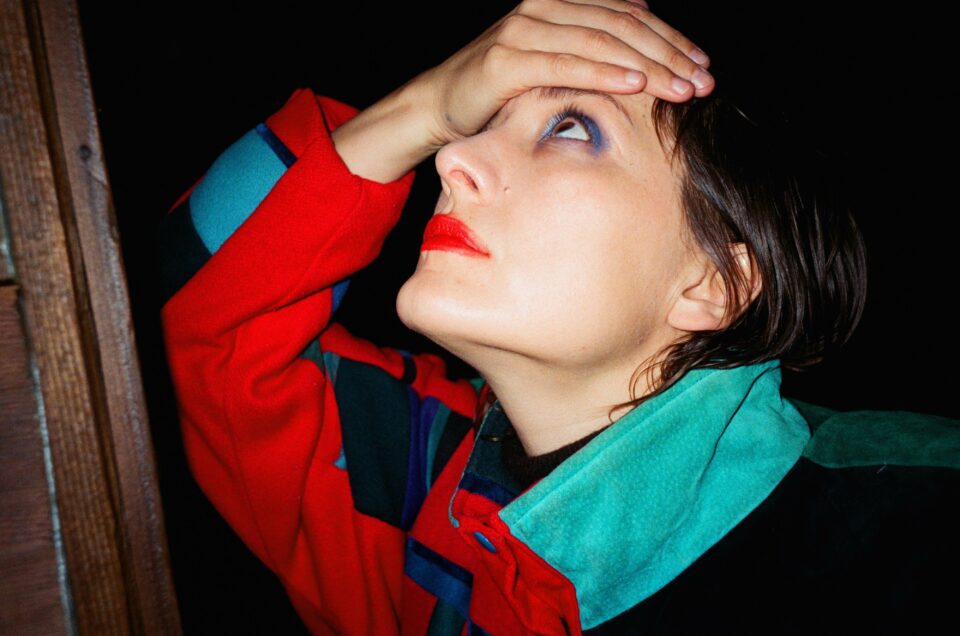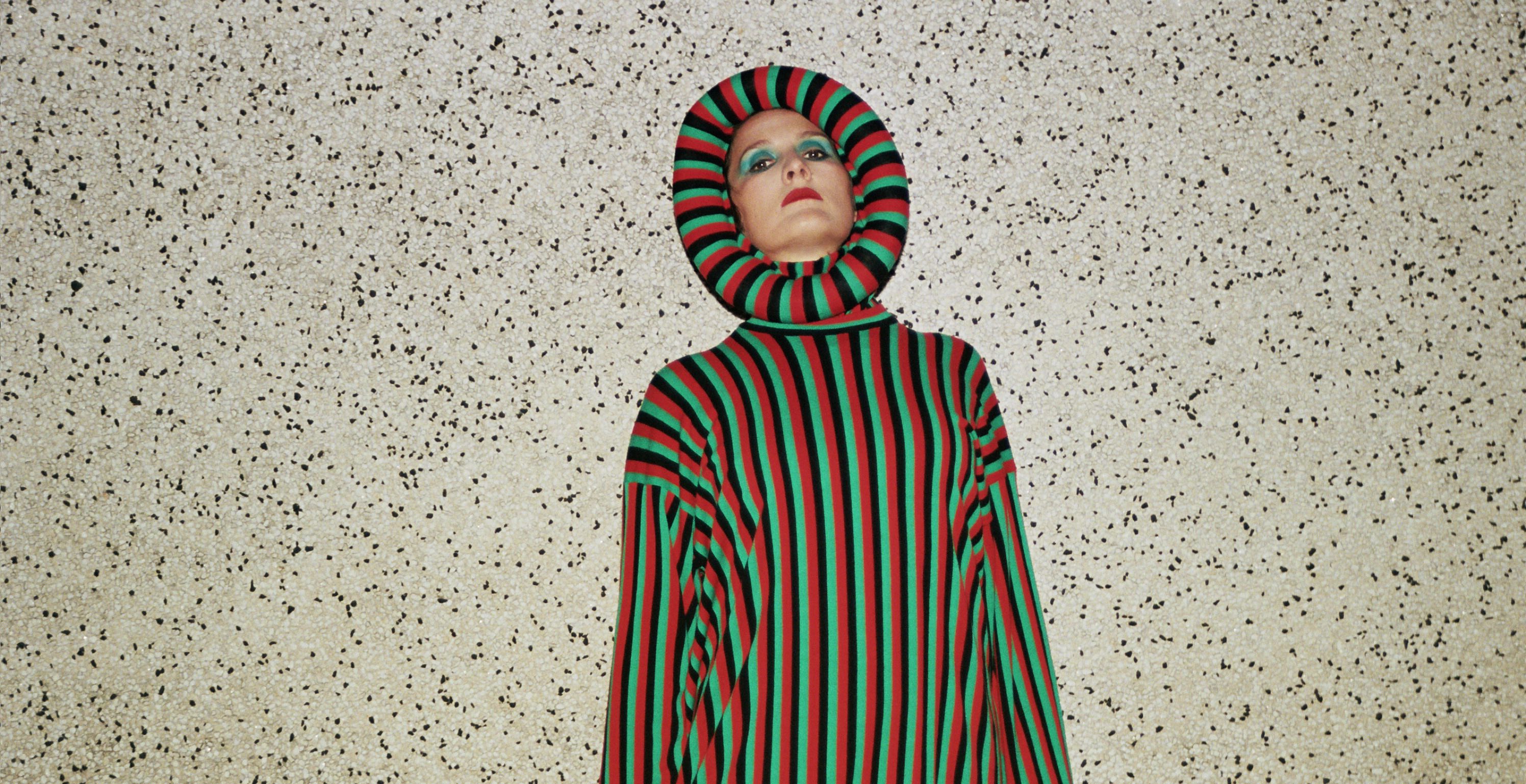Cate Le Bon has spent the last 13 years crafting a career all her own. From the folk songcraft of her debut to the structural and sonic exploration of 2019’s Reward, the Welsh songwriter is as singular and inventive as any modern musician. Her newest record, Pompeii, is as beguiling and beautiful as anything in her catalog, a percussive and endlessly layered search for time and space in a world where these ideas are as fickle as ever.
For Le Bon, curiosity was the driving force behind this sixth album. Working with a familiar team of collaborators, as well as taking on nearly every instrument on the record herself, allowed for a playfulness impossible to replicate in a more strictly structured environment. What results is a collection of songs that lives rather than languishes, whose pulse thuds along with a steady presence that resists stasis. “There’s a process of building and deconstructing and looking at it from different angles,” says Le Bon of the unusually lengthy recording process for Pompeii. “But it’s always with a sense of curiosity rather than an idea of perfection in mind.”
We talked with Le Bon about how she allowed for such spontaneity, the haunting timelessness of Pompeii, and unlocking your inner child.
You’ve had the record done for so long, but now you’re approaching the time when Pompeii goes out into the world. How does it feel to finally be ending that period of purgatory?
“Purgatory” is the right word. It’s alway quite an abrupt thing. The thing you’ve crafted in this really private world—even more so this time—when it becomes public it’s quite a transition. It’s usually a period of three months, but this has been seven months of trying to forget that it exists and having a strange relationship with it. But you usually take back claim of the record when you start playing live or you start talking about it in interviews. So yeah, it’s been strange.
“The complicated setting of a place like Pompeii resonated in many ways with a lot of how I was feeling and how my perspective of things was completely warped during the pandemic.”
You’ve talked about your somewhat contentious relationship with your own music once it’s out in the world, did you have a similar instinct to distance yourself from this album as soon as it was completed?
This record was made mostly in a very small bedroom in a terrace house in Cardiff during lockdown, so it was a very small space that [producer] Samur Khouja and I were occupying. The only thing we really had was this record to work on, so it became this piece of work that I’m overly familiar with from so many different angles. That made the transition even more brutal this time. Like I said, I think the joy of reclaiming the record when you get to play it live kind of eradicates any negative feelings I have about it when I hand it over.
How has your relationship to other people’s music changed over the years?
When I went to the Lake District maybe three years ago to study furniture building, I needed to take the focus off music because I’d been doing it for so long. I wanted to check in on my motives and nurture my relationship with it, because it’s something I love so much. There’s a danger when you do something you love for a job that it turns into habit over heart, and I really didn’t want that to happen. Sometimes when you work on music all day, everyday, you don’t have the hunger to listen to other people's music, but actually it’s a real tonic to get lost in other people’s creations. While making this record we’d have breaks for dinner and we’d listen to a hell of a lot of music, mostly instrumental or music in foreign languages to me. That was me just remembering that it’s a refuge.

When did you first become interested in Pompeii, and why did that feel like an accurate theme for the album?
Wherever you make a record, and whatever circumstances you make a record under, it’s going to have some kind of effect. When everything was coming together, the plans I’d initially had to make this record were completely incompatible with reality. I’d envisioned being somewhere in Norway or Chile, picturing somewhere where we could really get away and be in our own vacuum. We ended up in a vacuum of sorts, but it was very different from the one I’d anticipated. All these things are going to affect a record if we have a strong sense of what it was going to be previous to that.
“What I strive to do is to allow myself the freedom to do things because they feel good, not because I have any sense of audience. To create as if no one is watching, yourself included, almost like a child does.”
I was listening to a podcast and someone mentioned Pompeii. I started to think about Pompeii and how it was during the pandemic when nobody was there, and how that plays with the perspective of time. People’s final gestures captured in this permanence. The complicated setting of a place like Pompeii resonated in many ways with a lot of how I was feeling and how my perspective of things was completely warped during the pandemic.
You’ve talked about how you wanted to avoid having this album become overwrought or contrived, how do you avoid that as a songwriter?
I think that’s the goal for anything you make. What I strive to do is to travel without any preconceptions and allow myself the freedom to do things because they feel good, not because I have any sense of audience. To create as if no one is watching, yourself included, almost like a child does. I think that’s what I strive for in making anything.
Do you think at all about how you want your music to make people feel?
I think that comes when it's finished. It’s not that you’re disregarding an audience, it's just that when you’re in the throes of making something you kind of have to shut the window on it, otherwise it would just be your perceived idea of an audience rather than any real audience. For me, it would possibly set me off in the wrong direction. You have to try to give yourself the best chance at making something authentically you for the sake of anyone you'd hope would consume your record.
“You have to try to give yourself the best chance at making something authentically you for the sake of anyone you'd hope would consume your record.”
Can you tell me a little bit more about your relationship to moderation and why it felt like it was something you wanted to investigate?
I read this Lina Bo Bardi essay where she was railing against the chasm that opened between technical and scientific progress and the human capacity to think. I guess this idea of living in a world where there are accounting systems for the things that supposedly matter, but actually the things that really matter don’t have an accounting system and so often get completely disregarded. This idea was written in 1958 and everything in it is still relevant now. It’s progress over humanity. It resonated with all these feelings I was having over the pandemic of being forever connected to everything and all these incremental choices that have left us in these dire straits of a pandemic and global climate change crisis. Yet to be armed with all this knowledge and still often want the things that contribute to it is riddled with some kind of guilt that’s really hard to qualify with yourself.
You’ve said that producing a record can be largely about being as honest as you can with the people you’re working with. How has that experience helped you bring honesty to your own work?
It's quite hard not to be honest with yourself. You hope that when you look over your career you start to streamline and recognize what conditions you work best under. To be around people with whom you can be wholly honest when you’re making something yourself is really important. It’s not just, say, when I’m working with someone like Devendra [Barnhart]. I can be totally honest with him, but he has to trust me enough to be totally honest with me. And the same thing goes when I’m working with people on my own stuff—which is why I work with Samur, because he and I have an honest relationship where the work flow is really fluid and there are no compromises made because of it.
I was wondering whether there was any point during this record where you felt like you were pushing yourself out of your comfort zone in a way that felt new or exciting.
I think you always hope that if you’re working with the right people and you’re doing things for the right reasons, you’re always pushing those boundaries in any project you work on. Working with Samur, we both leaned into hope and curiosity by the end of it as opposed to this feeling of dread. You allow yourself the freedom to go wherever you want without painting yourself into a corner, or telling yourself the record has to be like this, or you have to satisfy these things. Just giving yourself complete freedom to roam is really a lovely way of exploring all the corners. FL







